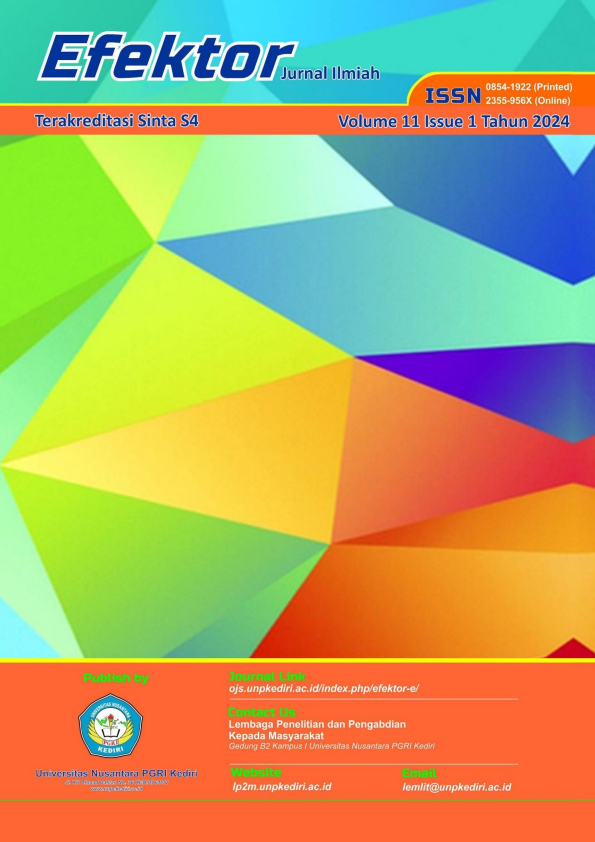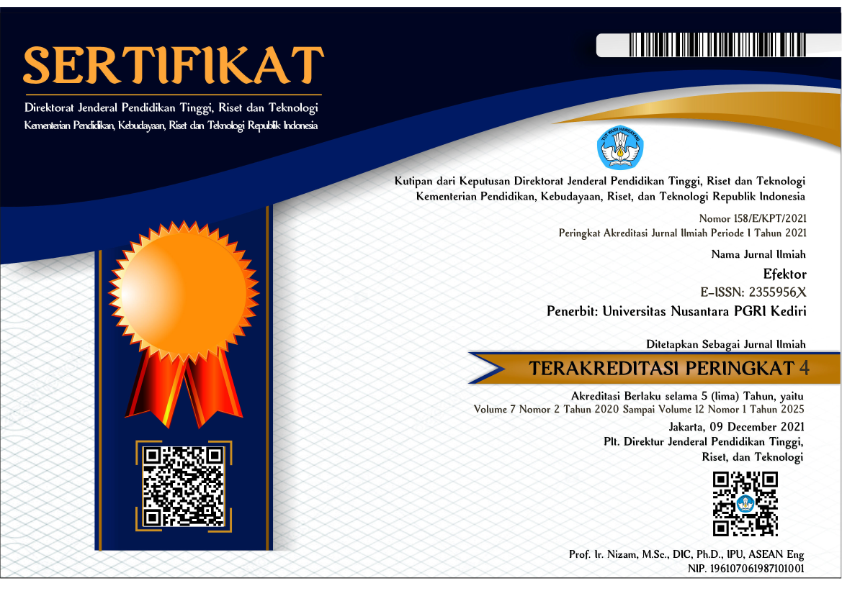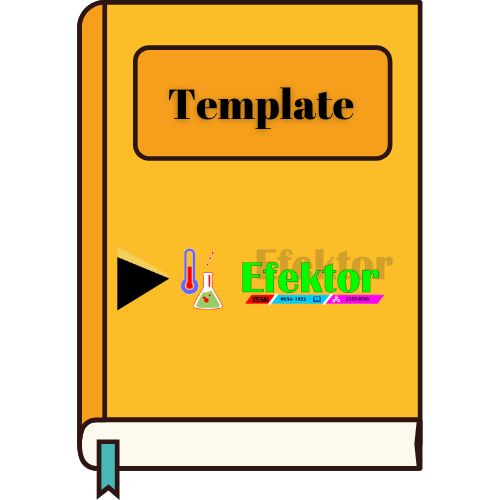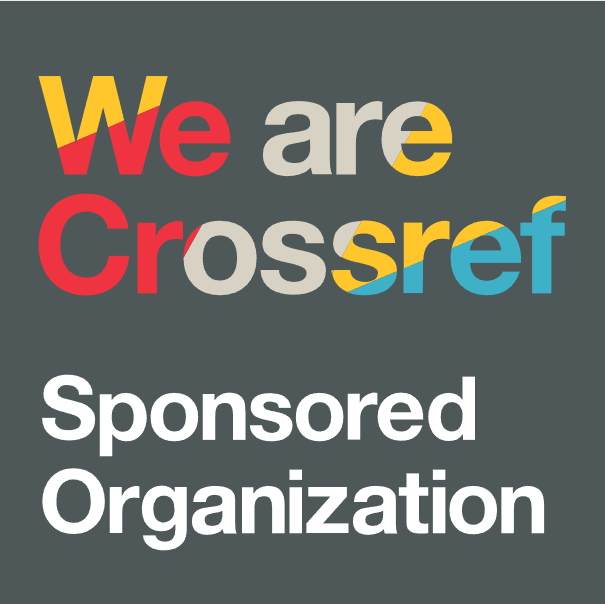Technology-based Learning Management System Implementation Analysis (LMS): The Role of Student Technology Skills in Increasing Engagement in Learning in Colleges
DOI:
https://doi.org/10.29407/e.v11i1.22407Keywords:
Learning Management System, Technical Skill Level, Student EngagementAbstract
The study aims to explore the role of student technology skills levels in the context of the use of learning platforms such as Blackboard Learn, Canvas, and Google Classroom, as well as their relationship with student participatory involvement levels. The research method uses a quantitative approach through surveys of students at various colleges. Using survey data from 120 students, the data was analyzed using regression analysis with the help of the PLS-SEM application, i.e. to understand whether the level of student technology skills mediates the relationship between the use of online learning platforms and student participation rates. The results showed that students' technology skills level played an important role in mediating the relationship between the use of Blackboard Learn, Canvas, and Google Classroom learning platforms and student engagement levels. Students with a higher level of technology skills tend to be more effective in using the Blackboard Learn, Canvas, and Google Classroom platforms that ultimately increase their involvement in the learning process. Knowing the relationship between technology skills, the use of online learning platforms, and the level of student participatory involvement, educational institutions can take concrete steps to increase student engagement in online learning. These can include additional technology skills training, improved accessibility to the learning platform, or the development of more interesting and interactive learning content.
References
Alkalai, Y. (2004). Digital Literacy: A Conceptual Framework for Survival Skills in the Digital era. Journal of Educational Multimedia and Hypermedia, 13(1), 93–106. http://www.editlib.org/p/4793/%5Cnfiles/364/Eshet and Eshet - 2004 - Digital Literacy A Conceptual Framework for Survi.pdf%5Cnfiles/459/4793.html
Alturise, F. (2020). Evaluation of the blackboard learn learning management system for full online courses in western branch colleges of Qassim university. International Journal of Emerging Technologies in Learning, 15(15), 33–51. https://doi.org/10.3991/ijet.v15i15.14199
Anuyahong, B., & Pucharoen, N. (2023). Exploring the Effectiveness of Mobile Learning Technologies in Enhancing Student Engagement and Learning Outcomes. International Journal of Emerging Technologies in Learning, 18(18), 50–63. https://doi.org/10.3991/ijet.v18i18.40445
Attard, C., Berger, N., & Mackenzie, E. (2021). The Positive Influence of Inquiry-Based Learning Teacher Professional Learning and Industry Partnerships on Student Engagement With STEM. Frontiers in Education, 6(August), 1–14. https://doi.org/10.3389/feduc.2021.693221
Cavus, N., Mohammed, Y. B., & Yakubu, M. N. (2021). Determinants of learning management systems during covid-19 pandemic for sustainable education. Sustainability (Switzerland), 13(9), 1–23. https://doi.org/10.3390/su13095189
Chairiyani, R. P., & Anggraini Kusumajati, D. (2021). The effect of online learning effectiveness against student achievement motivation (Case Study of Online Learning Student at Bina Nusantara University). ACM International Conference Proceeding Series, PartF16898, 135–140. https://doi.org/10.1145/3449365.3449387
Chin, W. W. (2010). How to Write Up and Report PLS Analysis. In Springer Berlin Heidelberg. https://doi.org/10.1007/978-3-540-32827-8
El-Sabagh, H. A. (2021). Adaptive e-learning environment based on learning styles and its impact on development students’ engagement. International Journal of Educational Technology in Higher Education, 18(1). https://doi.org/10.1186/s41239-021-00289-4
Eshet, Y. (2002). Digital literacy: A new terminology framework and its application to the design of meaningful technology-based learning environments. Association for the Advancement of Computing in Education, January 2002, 1–7.
Faisol, Sri Aliami, M. A. (2022). Pathway of Building SMEs Performance in Cluster through Innovation Capability. Economics Development Analysis Journal, 11(2), 140–152. https://doi.org/10.15294/edaj.v11i2.46442
Faisol, F., Astuti, P., & Winarko, S. P. (2021). The Role of Technology Usage in Mediating Intellectual Capital on SMEs Performance During the Covid-19 Era. ETIKONOMI, 20(2), 413–428. https://doi.org/10.15408/etk.v20i2.20172
Faisol, F., Suhardi, S., Astuti, P., & ... (2022). The Adoption of ICT To Improve the Performance of SMES in Digital Era. International Onference on Business & Social Sciences, 1(i), 1128–1141. https://debian.stiesia.ac.id/index.php/icobuss1st/article/view/286%0Ahttps://debian.stiesia.ac.id/index.php/icobuss1st/article/download/286/255
Faisol, Kumar, V., & Aliami, S. (2023). Mediating role of inter-firm linkages and innovation capability towards the sustainability of SMEs in Indonesia. International Journal of Technology, Policy and Management, 23(4), 387–409. https://doi.org/10.1504/IJTPM.2023.133918
Fornell, C., & Larcker, D. F. (1981). Structural Equation Models with Unobservable Variables and Measurement Error: Algebra and Statistics. Journal of Marketing Research, 18(3), 382. https://doi.org/10.2307/3150980
Francom, G. M., Schwan, A., & Nuatomue, J. N. (2021). Comparing Google Classroom and D2L Brightspace Using the Technology Acceptance Model. TechTrends, 65(1), 111–119. https://doi.org/10.1007/s11528-020-00533-0
Gaad, A. L. V. (2022). The Effects of Online Collaborative Learning (OCL) on Student Achievement and Engagement. IAFOR Journal of Education, 10(3), 31–48. https://doi.org/10.22492/ije.10.3.02
Hair, J. F., Babin, B. J., & Krey, N. (2017). Covariance-Based Structural Equation Modeling in the Journal of Advertising: Review and Recommendations. Journal of Advertising, 46(1), 163–177. https://doi.org/10.1080/00913367.2017.1281777
Hair, J. F., Ringle, C. M., & Sarstedt, M. (2013). Partial Least Squares Structural Equation Modeling: Rigorous Applications, Better Results and Higher Acceptance. Long Range Planning, 46(1–2), 1–12. https://doi.org/10.1016/j.lrp.2013.01.001
Hair, J. F., Sarstedt, M., Ringle, C. M., & Gudergan, S. P. (2017). Advanced Issues in Partial Least Squares Structural Equation Modeling. 272 Page; SAGE Publications, Inc.
Hakami, T. A., Al-Shargabi, B., Sabri, O., & Khan, S. M. F. A. (2023). Impact of Blackboard Technology Acceptance on Students Learning in Saudi Arabia. Journal of Educators Online, 20(3). https://doi.org/10.9743/JEO.2023.20.3.13
Henseler, J., Ringle, C. M., & Sinkovics, R. R. (2009). The use of partial least squares path modeling in international marketing. Advances in International Marketing, 20(2009), 277–319. https://doi.org/10.1108/S1474-7979(2009)0000020014
Indra Chusnuraafi, H., Ekohariadi, E., Joko, J., & Marniati, M. (2022). Application of Google Classroom with Flipped Classroom Learning Model on Student Learning Outcomes at SMK Unitomo Surabaya. EduLine: Journal of Education and Learning Innovation, 2(3), 267–272. https://doi.org/10.35877/454ri.eduline1132
Karwati, K., Madjid, T. A., Yanuardi, Y., & Nurhayati, N. (2022). The Influence between the Use of Online Learning Media and Student Learning Independence on Learning Outcomes in Creative Product and Entrepreneurship Subjects. International Journal on Engineering, Science and Technology, 2(3), 143–159. https://doi.org/10.46328/ijonest.110
Khaeruman, K., & Nurhidayati, S. (2021). Efektifitas Multimedia Berbasis Potensi Lokal Untuk Meningkatkan Keterampilan Mengajar Mahasiswa Pada Mata Kuliah Strategi Pembelajaran Kimia. JISIP (Jurnal Ilmu Sosial Dan Pendidikan), 5(2), 678–684. https://doi.org/10.58258/jisip.v5i2.2044
Learning, D. (2024). Impact of Online Learning Platforms on Student Engagement in India Divya Joshi. 5(1), 1–13.
Ningtyas, S. I. (2022). Analisis Optimalisasi Perkuliahan Dalam Jaringan (Daring) Pada Mahasiswa Pendidikan Ekonomi Unindra. Research and Development Journal of Education, 8(1), 116. https://doi.org/10.30998/rdje.v8i1.11747
Santi, A. (2022). Analisis Penerapan Blended Learning Pada Mata Kuliah Ekonomi Pembangunan Di Era New Normal. JPEKA: Jurnal Pendidikan Ekonomi, Manajemen Dan Keuangan, 6(2), 65–78. https://doi.org/10.26740/jpeka.v6n2.p65-78
Sarstedt, M., Hair, J. F., Cheah, J. H., Becker, J. M., & Ringle, C. M. (2019). How to specify, estimate, and validate higher-order constructs in PLS-SEM. Australasian Marketing Journal, 27(3), 197–211. https://doi.org/10.1016/j.ausmj.2019.05.003
Sharma, M., & Srivastav, G. (2020). Study and Review of Learning Management System Software. Lecture Notes in Networks and Systems, 103(March), 373–383. https://doi.org/10.1007/978-981-15-2043-3_42
SIMBOLON, D. H. (2021). Implementasi Lms (Learning Management System) Moodle Terhadap Hasil Belajar Mahasiswa Di Universitas Quality. Jurnal Curere, 5(1), 1. https://doi.org/10.36764/jc.v5i1.549
Torres-Madroñero, E. M., Torres-Madroñero, M. C., & Botero, L. D. R. (2020). Challenges and possibilities of ICT-mediated assessment in virtual teaching and learning processes. Future Internet, 12(12), 1–20. https://doi.org/10.3390/fi12120232
Tubagus, M., Muslim, S., & Suriani. (2020). Development of learning management system-based blended learning model using claroline in higher education. International Journal of Interactive Mobile Technologies, 14(6), 186–194. https://doi.org/10.3991/IJIM.V14I06.13399
Ulfaika, R., . R., & Firdausya, A. (2023). Student Literacy Skills on Academic Performance as the Implication of Online Learning to University Students. KnE Social Sciences, 202, 234–259. https://doi.org/10.18502/kss.v8i10.13450
Wilson, B. (2017). The Mediation Handbook: Research, Theory, and Practice Edited by Alexia Georgakopoulos. Mediation Theory and Practice, 2(2), 210–212. https://doi.org/10.1558/mtp.34597
Xianggang, W. E. I. (2023). The Impact of Online Learning Platforms on Student Engagement and Success in Higher Education: A Systematic Review. Higher Education and Oriental Studies, 3(3), 38–46. https://doi.org/10.54435/heos.v3i3.104
Yamani, H. A., Alharthi, A. D., & Smirani, L. K. (2022). Evaluation of Learning Management Systems A Comparative Study Between Blackboard and Brightspace. International Journal of Emerging Technologies in Learning, 17(7), 125–144. https://doi.org/10.3991/ijet.v17i07.28881
Zhan, Z., Xu, F., & Ye, H. (2023). Effects of an online learning community on student engagement and academic performance. Computers & Education, 6(1), 231–239.
Downloads
Published
Issue
Section
License
Authors who publish with this journal agree to the following terms:
- Copyright on any article is retained by the author(s).
- The author grants the journal, the right of first publication with the work simultaneously licensed under a Creative Commons Attribution License that allows others to share the work with an acknowledgment of the work’s authorship and initial publication in this journal.
- Authors are able to enter into separate, additional contractual arrangements for the non-exclusive distribution of the journal’s published version of the work (e.g., post it to an institutional repository or publish it in a book), with an acknowledgment of its initial publication in this journal.
- Authors are permitted and encouraged to post their work online (e.g., in institutional repositories or on their website) prior to and during the submission process, as it can lead to productive exchanges, as well as earlier and greater citation of published work.
- The article and any associated published material is distributed under the Creative Commons Attribution-ShareAlike 4.0 International License













